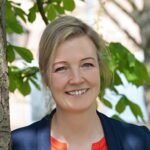
Presentation Title
Tuning multi-enzyme catalysed processes – modular cascade set-up, activity regulation, and integration with microbial and chemical transformations.
Presentation Abstract
There is an urgent need for the development of greener syntheses procedures if we want to maintain an environment worth living in and keep a high standard in material comfort (or reach a higher one in developing countries). The establishment of more biocatalytic steps in chemical syntheses is one possible solution, as enzymes and whole cells offer sustainable advantages, such as biodegradability, intoxicity, high selectivity, and many more. As a myriad of enzymatic reactions exist for almost any product, their potential is immense. Great scientific achievements and new techniques have enabled the design of economically and ecologically feasible one-step and multi-step enzyme catalysed reactions. This presentation will highlight the advantages of multi-enzyme catalysed processes especially with respect to atom- and step efficiency, selectivity and modularity.
However, with new opportunities, also new challenges arise. Two new possibilities, including our efforts to circumvent the associated disadvantages, will be subsequently presented: (A) avoiding cross-reactivity in (self-) regulated one-enzyme cascades and (B) the potential of using renewable resources as starting materials when microbial cell factories, enzymes and chemical catalysts are combined effectively.
(A) The more enzyme steps are combined, the higher the risk of undesired cross-reactivity. Separation in space or on time can solve this issue. In the ‘LightCas’-project we investigate the possibilities to avoid cross-reactivity in one-pot systems by separation of reaction steps in time. With the help of sequential enzyme addition and on-demand light-induced enzyme inactivation1, a tight control of each biocatalytic step in a one-pot cascade is possible. This results in high product purity. Due to online analytics and automation, our ultimate goal is in close reach: setting up a one-pot multi-step light-controlled enzyme reactor yielding tetrahydroisoquinolines2 from cheap substrates with high selectivity and concentration in a technically self-controlled manner.
(B) The combination of suitable chemical and biological catalysts with their intrinsic advantages holds the potential to develop processes that are truly superior to current production methods in terms of efficiency and sustainability. In such hybrid processes, e.g. microorganisms can use substrates from human waste streams from agriculture and the food industry to provide simple chemical building blocks. Then, enzymes are used to diversify these compounds in vitro, enabling the construction of product platforms of valuable fine chemicals, complex (chiral) building blocks and active pharmaceutical ingredients. In addition, chemical transformations can complement and diversify this product portfolio. This approach will be shown on the examples of (i) a hybrid process for the bio-based production of chiral amino alcohols from xylose and glucose3,4 (Figure 1) and (ii) the adaptive use of renewable raw materials and the integration of CO2 in the chemo-enzymatic production of chiral diols and dioxolanes5. Challenges, like the identification of suitable reaction conditions for each individual catalysts and the need of integrating downstream processing6 to make these hybrid processes truly advantageous over other strategies will be discussed.
About Dörte
Dörte Rother holds a diploma degree in biology from RWTH Aachen University. She conducted her PhD at the Heinrich-Heine University Düsseldorf (with research stays at Karolinska Institute Stockholm, University of Freiburg and University of Stuttgart). In 2008 she received a DFG-postdoc scholarship to work at Aachen University and became in 2009 postdoctoral student at the IBG-1: Biotechnology at Research Center Jülich. In 2012 she started her own Helmholtz-young investigators group in Jülich, which is additionally funded by a ERC-starting grant since 2017. In 2018 Dörte Rother was appointed as full professor for `synthetic enzyme cascades’ at Aachen University and leads the group `biocatalysis’ at Research Center Jülich. She has three children.
She received the DECHEMA-Prize 2018 and the Biotrans Junior Award 2019 for her outstanding research activities in multi-step biocatalysis and sustainable process development.

